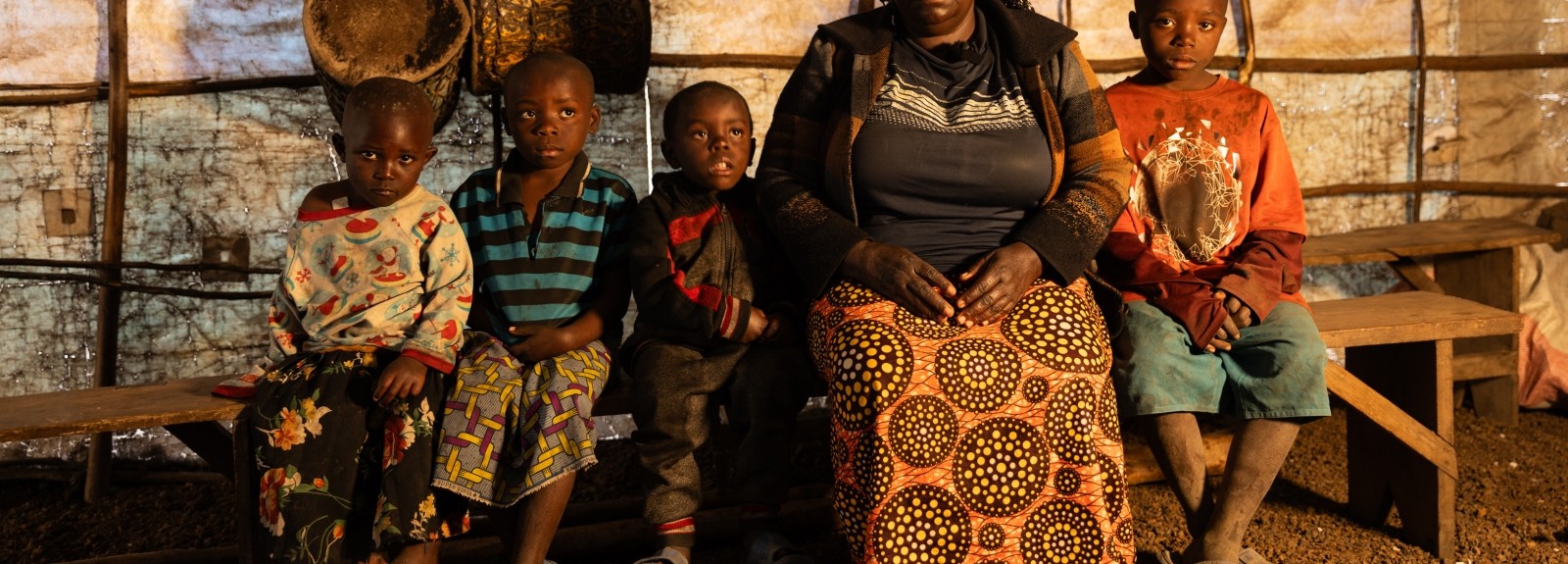The number of displaced people worldwide has reached unprecedented levels, with over 110 million people forcibly displaced by the end of 2023, according to estimates by the UN Refugee Agency (UNHCR). This includes refugees, asylum seekers, and internally displaced persons (IDPs) driven from their homes by conflicts, persecution, human rights violations, and climate-induced disasters.
The M23 conflict causes massive displacement in DRC
The M23 conflict in the Democratic Republic of the Congo (DRC) has caused a massive displacement crisis, with 2 million people forced from their homes in North Kivu province and surrounding areas since the resurgence of fighting in 2021. Many of the displaced have fled to overcrowded camps near Goma or have sought refuge in makeshift shelters with limited access to food, water, and medical care.
When the M23 occupation came to Fela Mbahibwe’s village in Kibumba, she was determined to keep her children and grandchildren with her. She tied them all together in a line with rope and carried the younger ones on her back. She recalls that day when they all had to flee, saying, “When we came from Kibumba, we heard a lot of bullets. When they arrived at Kumugini, they killed a lot of people and that’s when we fled. We just grabbed our kids. We ran in all directions. We just ran. We didn’t carry anything. No utensils, we just took the children. Others died while trying to run. We just continued running.”
Fela’s husband was among those who were killed when the first bullets rained down upon their village. She says, “My husband was killed. I just fled with my children. Others also just carried their kids. You put one kid on your back and the other in front, so they don’t get lost. One on the back like this.” She demonstrates how she tied her children to her, “And the other one in front or with a rope. We walk in a line. We tied ourselves together like that so we wouldn’t get lost.” She continues, “I lost my life just like that.”
Life in Kanyaruchinya Camp
When Fela and her family arrived at Kanyaruchinya Camp near the outskirts of Goma, the situation was dire. Thousands of people had fled their homes and arrived in the same situation as her—with nothing. She recalls, “When we arrived here, we didn’t have anything...We slept outside. We got rained on. We started building temporary shelters from shrubs that we collected. That’s what we built with, just to get a place to lie down. We got the tents just recently.” She continues, “We are just desolate. Our children don’t go to school anymore. We are just surviving.”
With the help of Corus organization IMA World Health, Fela and her family can at least survive with a little more comfort and warmth. Fela says, “I went to get a blanket given to me by IMA. IMA gave us detergents. We didn’t get any help beforehand. But I thank IMA. They gave us blankets to cover ourselves and our kids.”
Fela and her grandchildren rest under a quilt they received from IMA World Health’s fellow Corus organization Lutheran World Relief.
Village Savings and Loan Associations provide livelihood options for IDPs
Fela has also gained a vital opportunity to support her family through the Village Savings and Loan Association, known locally as AVEC, that IMA World Health established at the camp to unlock new livelihood possibilities for IDPs like her. Each week, members donate a small amount of money to the group, and, after a period, they are eligible to receive microloans that can be used to invest in a small business. For Fela’s family, AVEC has been lifechanging. She says, “For some time, I didn’t get work here. I washed people's clothes. But IMA brought the AVEC initiative. I joined AVEC. IMA brought happiness.”
Fela was able to open a small roadside stall with the money she borrowed from her local AVEC group. She is aware of how important the program has been in helping protect her older children from violence. Faye, her daughter and oldest, works the roadside stall with her. Fela is certain that, “If she wasn't there, she would be in the forest and vulnerable to reckless violence. She would be among the hungry ones. She would be a victim.” Now both Fela and Fay can safely earn money to provide for themselves and their children as they seek to build a future for their family despite their displacement.
Fela and her daughter Faye run a roadside food stand in Kanyaruchinya Camp, allowing Faye to avoid more risky activities like collecting wood in the forest alone.
We thank IMA for all the work they did for us. Keep following us. Don't let us go while we are in this war. In this misery of war. Just help us, remember us, don't let us go.

